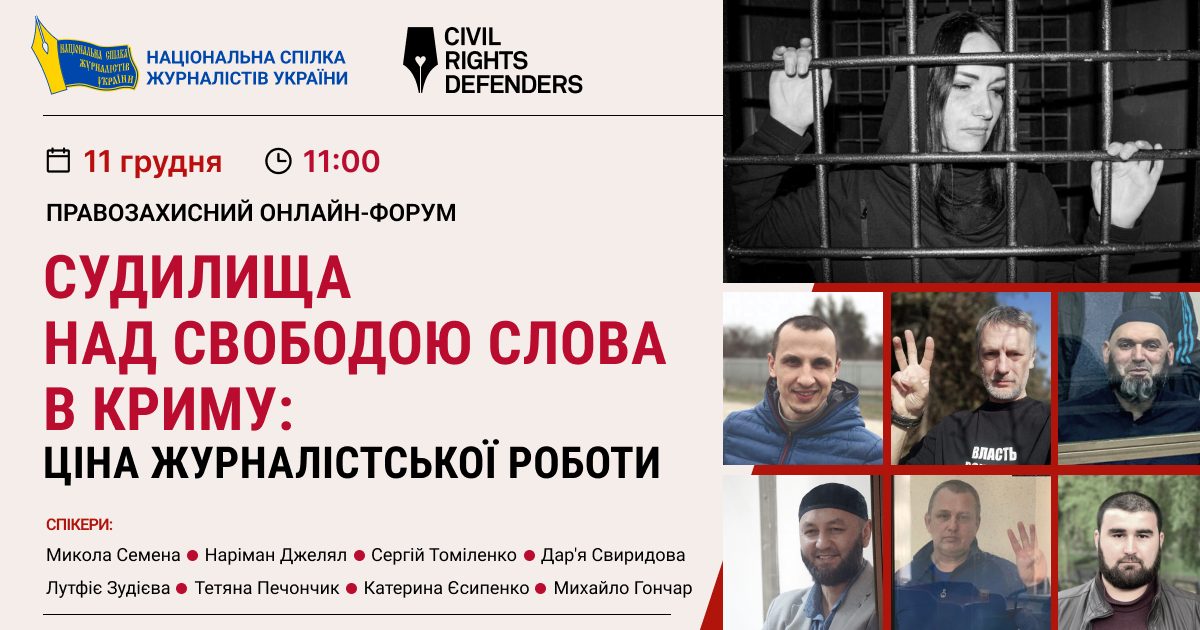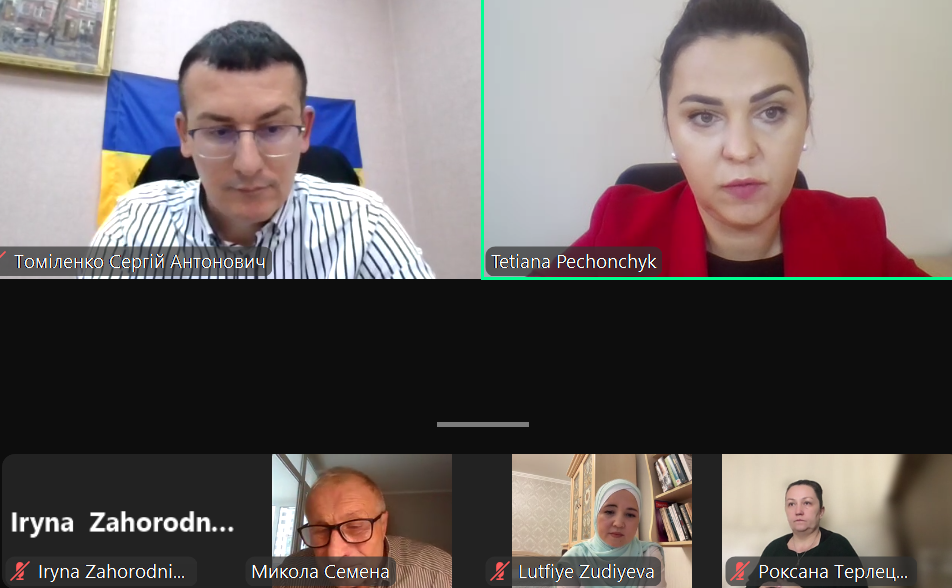The price of truth and freedom of speech: ZMINA participated in a forum on repressions against Crimean journalists
On December 11, 2024, the online forum “Trials against freedom of speech in Crimea: the price of journalistic work” was held, organised by the National Union of Journalists of Ukraine (NUJU) with the support of Civil Rights Defenders, with the participation of journalists, human rights defenders and relatives of political prisoners. The event drew attention to the systematic persecution of journalists in the occupied Crimea, highlighted their heroism and discussed legal and political ways for their release.

Opening the event, the Head of the NUJU, Serhii Tomilenko, stressed that repressions against freedom of speech in Crimea have been ongoing since 2014 and are only getting worse. He commended the courage of journalists who continue to work despite the oppression.
The Head of the Human Rights Centre ZMINA, Tetiana Pechonchyk, spoke about the deteriorating situation with freedom of speech in Crimea. According to her, the harassment of journalists and civil society activists is increasing, and the most common forms of repression are searches, detentions, administrative fines and criminal prosecutions.
“Since the beginning of this year, there have been numerous cases of attacks on professional media workers and citizen journalists. In particular, journalists of the Crimean Solidarity initiative, the newspaper Qirim, the publications Nenkedzhan, Crimean Process, and the children’s magazine Armanchyk. This once again demonstrates the threat that the occupation authorities see in freedom of speech,” Pechonchyk stressed.
In particular, according to her, Qirim’s Editor-in-Chief Bekir Mamutov and the Founder of the publication, Seiran Ibrahimov, were accused of “discrediting the Russian Armed Forces”. In May 2024, their homes and editorial offices were searched, and administrative reports were drawn up against them. Ibrahimov felt ill during the searches but was not provided with medical care. They were also not allowed to see their lawyer Edem Semedliaiev, which violated their right to defence.
The newspaper Qirim is regularly subjected to pressure, including fines for publications that the occupation authorities consider to be “violations of the law on information”, including “abuse of freedom of information” and “discrediting the Russian army”. Thus, fines were imposed for the publication of a report by the UN Secretary-General, which mentioned the Mejlis of the Crimean Tatar People.
Additionally, from relatively recent persecutions – pressure from the occupiers on Ediye Muslimova, who is the editor-in-chief of the Crimean Tatar children’s magazine “Armanchyk”. According to Muslimova, she was not physically pressured, but many questions were asked about the activities of the publication, which has about 1,500 subscribers. The magazine is an important element of the development of Crimean Tatar culture and has been published since 2011.

During the event, Tetiana Pechonchyk mentioned the efforts of the authorities and the public aimed at releasing illegally detained journalists: “At a meeting with President Volodymyr Zelenskyy, we handed over a list of 30 imprisoned journalists, 18 of whom were Crimean journalists. The beginning of the exchanges and releases of Crimean political prisoners, such as Nariman Dzhelyal and Leniie Umerova, gives us hope that journalists will be among the next released.“
The issue of persecution of journalists remains a key one for human rights defenders, as freedom of speech in the occupied Crimea is not only a fundamental right but also an important element of countering repression.
Lutfiye Zudiyeva, Coordinator of Crimean Solidarity, said that at least 18 Crimean journalists are in detention, 17 of them were transferred from Crimea and are currently being held in all regions of the Russian Federation. A separate topic is the terms for which they are illegally sentenced, as well as their health condition and lack of proper medical care. She stressed the need to ensure access to doctors and the ombudsmen.
The Crimean Solidarity coordinator also shared her own story of persecution: “In February of this year, I was searched. My laptop and phone were seized. Four administrative cases were opened against me because of my journalistic texts about political prisoners. The oppression of journalists in Crimea continues, but I believe that it will not always be like this.“
Daria Svyrydova, Lawyer and Expert of Ukraine 5 AM Coalition, noted that the work of journalists under occupation is attracting less and less attention. She noted that Russia uses the persecution of freedom of speech as a tool of war: “This is not only a violation of rights, but also a strategy of warfare.“
Mykhailo Honchar, President of Strategy-XXI, stressed that Ukraine needs to remind the West about the problem of political prisoners of the Kremlin and journalists who have been subjected to repression.
Kateryna Yesypenko, wife of illegally imprisoned Radio Liberty journalist Vladyslav Yesypenko, said that his arrest was an attempt to silence independent voices. “Freedom of speech is unacceptable to the FSB, as it challenges the system of repression,” she stressed.
Nariman Dzhelyal, First Deputy Chairman of the Mejlis of the Crimean Tatar People and former political prisoner, shared his experience. He stressed the importance of paying attention to imprisoned journalists: “Information gives power. It gives you a feeling that you are not alone, that not only your family remembers you. This is of great importance for those who are behind bars.“
During the forum, a collection of materials about imprisoned journalists was presented, which was created by the NUJU under the leadership of Crimean journalist Mykola Semena. Semena noted that this collection is intended to draw attention to the heroism of journalists who were imprisoned because of their fight for the truth.
You can read the collection here.
If you have found a spelling error, please, notify us by selecting that text and pressing Ctrl+Enter.















